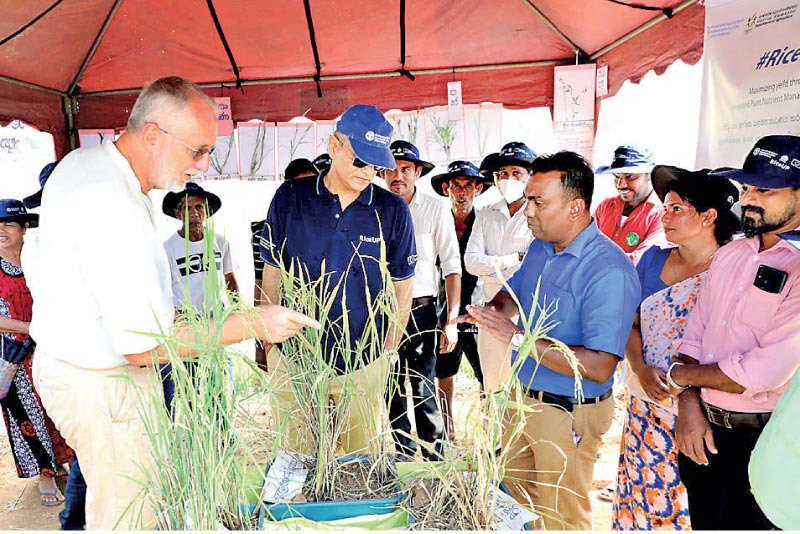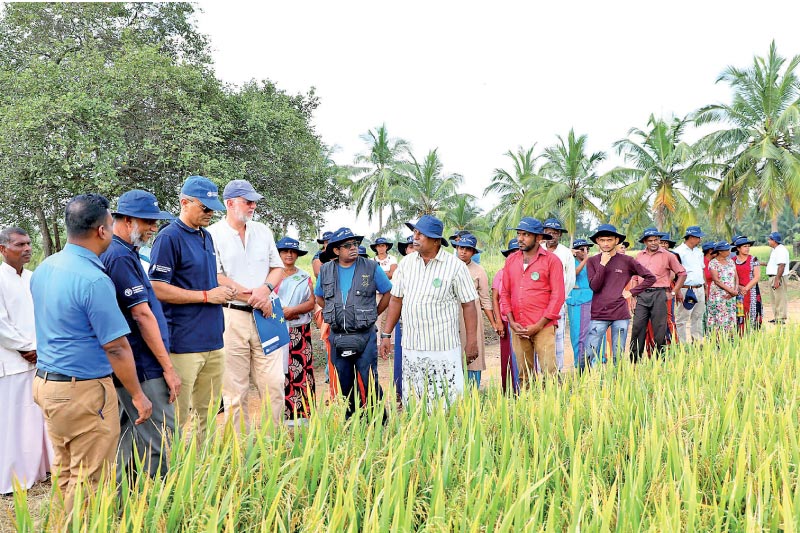Wednesday Feb 18, 2026
Wednesday Feb 18, 2026
Monday, 18 March 2024 02:07 - - {{hitsCtrl.values.hits}}

The Food and Agriculture Organisation of the United Nations (FAO) and the Department of Agriculture in collaboration with the European Union (EU), have launched a transformative initiative aimed at enhancing the knowledge and practices of Integrated Plant Nutrient Management (IPNM) among paddy farmers across Sri Lanka.
This initiative is marked by the commencement of a series of Farmer Field Days, starting with the inaugural Farmer Field Day in Polonnaruwa on 5 March, and the introduction of the ground-breaking digital learning platform, Nena Wagawa (නැණ වගා ව).
The inaugural Farmer Field Day, held under the theme “Fertile Soil for a Bountiful Harvest,” was inaugurated by Delegation of the European Union to Sri Lanka and the Maldives Head of Cooperation Johann Hesse, Sri Lanka and the Maldives FAO Representative Vimlendra Sharan, and key representatives from the Department of Agriculture. 330 farmers and agriculture students from two schools participated, gaining hands-on experience and insights into the application of IPNM techniques for more sustainable and productive farming.
The Farmer Field Days are a key component of the RiceUP project, a collaborative effort between FAO and the Sri Lankan Government, funded with €4 million from the European Union. RiceUP aims to fortify the resilience of Sri Lanka’s food security system by advancing IPNM practices among smallholder farmers, thereby enhancing their livelihoods while boosting the production of quality paddy seeds for better productivity in paddy farming.
Central to this initiative is the launch of the Nena Wagawa digital learning platform, a pioneering step towards bringing IPNM knowledge directly to farmers. This online portal offers comprehensive e-learning courses in Sinhala, Tamil, and English, designed to educate farmers on the nuances of IPNM in paddy farming. Accessible from anywhere through internet-connected devices, nenawagawa.doa.gov.lk is set to revolutionise how farmers learn and apply sustainable agricultural practices.
The RiceUP initiative has already made significant strides, with 6,000 farmers across Ampara, Badulla, Hambantota, and Polonnaruwa Districts receiving training on IPNM from 289 agriculture extension officers. This training aims to promote the efficient use of fertilisers and other inputs, leading to reduced costs, improved productivity, and enhanced resilience against future agricultural challenges.
On the occasion, Johann Hesse expressed, “Our collaboration with FAO signifies a shared commitment to revitalising Sri Lanka’s agriculture, addressing food shortages, and enhancing the livelihoods of farmers. Together, we have supplied essential inputs like fertilisers and seedlings, meeting crucial needs within the sector. We anticipate that the ongoing EU grant, along with FAO’s technical assistance, will expedite the shift toward a more sustainable, resilient, and productive agriculture sector in Sri Lanka.”
FAO Representative in Sri Lanka Vimlendra Sharan thanked EU for its support in introducing sustainable and climate smart agronomic practices in Sri Lanka and shared FAO’s plans to scale up the training programme and take it to over 400,000 paddy farmers in the country. Besides lowering the carbon footprint of paddy farming in the country he also emphasised the higher returns IPNM fetches the farmers through increased productivity and reduced input costs, especially of chemical fertilisers.
FAO, in partnership with its stakeholders, is committed to the continued support and development of Sri Lanka’s paddy farming sector. By fostering sustainable farming practices and leveraging innovative learning tools like the Nena Wagawa platform, the initiative seeks to secure long-term food security, improve livelihoods, and ensure the environmental sustainability of agriculture in Sri Lanka.
